Category: Topics in the syllabus
There are several different ways in English that you can talk about the future. Here are only three ways:
For predictions (will)
The auxiliary verb will is used in making predictions or simple statements of fact about the future.
The structure for the simple future is: will + infinitive form
However, if we use this this auxiliary we are guessing. We do not have any evidence in the present telling us what the future is going to be.
Examples:
For intentions (be going to + verb)
The auxiliary verb going to is used in talking about predictions, future plans or intentions. We use be going to to predict something that we think is certain to happen or which we have evidence for now.
Examples:
For arrangements (present continuous)
The present continuous tense is used for talking about arrangements that are planned with another person, a group of people, organization or company.
The structure for the present continuous is: verb to be (am/is/are) + infinitive form + ing
Examples:
- For predictions (will).
- For intentions (be going to + verb).
- For arrangements (present continuous).
For predictions (will)
The auxiliary verb will is used in making predictions or simple statements of fact about the future.
The structure for the simple future is: will + infinitive form
However, if we use this this auxiliary we are guessing. We do not have any evidence in the present telling us what the future is going to be.
Examples:
- It will rain tomorrow.
- I think the sun will rise at 7 am.
- I'll buy a new car next year.
- The concert will begin at 8 o’clock.
- Yurem will not be the next manager.
- There won´t be any snow.
- I’m sure you will enjoy the film.
- I predict that they won’t win the world cup this year.
- Will you go to the party? Yes I will.
- Who do you think will get the job? Caleb will get it.
For intentions (be going to + verb)
The auxiliary verb going to is used in talking about predictions, future plans or intentions. We use be going to to predict something that we think is certain to happen or which we have evidence for now.
Examples:
- It’s going to rain. (The speaker can probably see dark clouds.)
- Look out! He’s going to break that glass.
- She is going to buy a new dress tonight.
- I'm going to work in a hospital when I leave school.
- He’s going to be a professional player when he grows up.
- We are not going to do exercise. We are tired.
- Are you going to play volleyball after school? -No, I’m not.
- What are you going to have for lunch today? -We are going to have ribs.
For arrangements (present continuous)
The present continuous tense is used for talking about arrangements that are planned with another person, a group of people, organization or company.
The structure for the present continuous is: verb to be (am/is/are) + infinitive form + ing
Examples:
- Kim is traveling to New York next week. (She has made this arrangement with the airline).
- They are taking the train to Paris tomorrow.
- I'm working over the New Year.
- Our grandparents are visiting us this Christmas.
- My sister's going to the dentist tomorrow.
- They’re not selling the house.
- Are you having a party for your birthday? Yes, I am.


